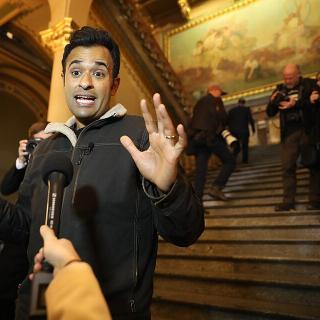Spend enough time in America’s biggest little city with over one-thousand Libertarians and you’ll start to understand why Johnny Cash shot a man in Reno just to watch him die. However, that would be a violation of the non-aggression principle –– commonly known as “the NAP” to Libertarians, who will also debate the topic ad nauseam until you’ll want to take one yourself. Every two years, the members of America’s biggest little political party engage in the usual shenanigans that make it the third largest in the nation, albeit a distant third. This year’s convention was held at the notable Nugget Casino Resort and featured divided factions, drama, spirited debates and just plain spirits to decide the party’s future. After all, Libertarians know plenty about nuggets, whether they’re made of gold, weed or chicken.
Perhaps it’s difficult for people to understand how a minor political party that regularly receives less than five percent of the vote in any meaningful election got so divided itself. It’s a good question, one that even this author –– having attended five Libertarian National Conventions in the last 10 years –– doesn’t know the answer to. A more veteran member of the party told me that, “The Libertarian Party isn’t this divided, except for every two years.” And it’s true –– my first convention in Las Vegas in 2012 pitted what was then known as the “radical caucus” of the party against the “pragmatic caucus.” The convention ended with the radicals being so opposed to a pragmatist getting elected as the party’s leader, that they delayed the election until a majority of the pragmatists had to leave Las Vegas and couldn’t even vote.
Since 2008, these affairs have typically ended with the party’s pragmatists choosing the candidates for President and Vice-President, although the Libertarian standard bearers tend to only get between one and three percent of the national vote. However, the party’s “radical” ilk would frequently run for (and win) positions within the party’s incomprehensible committee structure –– including such illustrious jobs as party chair, vice-chair, various committee members and so on. These positions are elected every two years and often see several qualified –– and not-qualified –– Libertarians of various backgrounds facing off in what can sometimes be contentious competitions. Apparently, these factions still exist until this day, except now they’re made up of slightly more aggressive members. It’s new dogs with old tricks.
Ten years after the 2012 convention, these new dogs showed up en masse to the party's gathering in Reno with several of those same Vegas tricks in hand. But now the new “radical” caucus –– commonly referred to as the “Mises Caucus” –– is a motivated movement of old Ron Paul fans, new podcast edgelords and even longtime Libertarians who are just bitter about how the party’s leadership ran things the last few years. For most Libertarian critics, the Mises Caucus reeks of when Republican grifters took the party by smarm –– first in 2008 with Bob Barr and Wayne Allen Root, charlatans who would later just become Republicans again. In 2016 it was former governors Gary Johnson and Bill Weld, who many Libertarians felt weren’t “libertarian enough.” The Mises Caucus has members on all sides of these varied criticisms.
Of course, there are also more extreme critics who say the massive Mises Caucus could even be a deep state plot –– an intelligence-led psych-op created to derail the last minor party that was still consistently maintaining funding and ballot access in all fifty states. Others say the members of the Mises “cult” are borderline white supremacists and Nazi sympathizers who feel like the Republican Party has gotten too tame for them. Organized, collective and consistently having a two-thirds majority on nearly every vote that mattered, the Mises Caucus and their media megaphones staged a self-described “takeover” of the Libertarian Party by winning every office they needed to fully control the complete committee. With almost cult-like fervor, they dominated every election from Friday through late Sunday at the convention.
If the term “takeover” seems like an extreme description for something that happened to a libertarian organization, it is. The Mises Caucus’ desire to literally “take over” an entire minor political party en masse may not necessarily bode well with the ideology of individual rights –– especially when the caucus was at times voting against basic procedural measures, like counting all of the delegation’s votes. Either way, the song of democracy remains the same –– elections are decided by those who show up. Even a political party based on individualism can be “taken over” by collectivism. Like Johnny Cash, perhaps the Mises Caucus wanted to kill a political party in Reno just to watch it die. But we should never forget that Johnny also warned us to not always take our guns to town.



